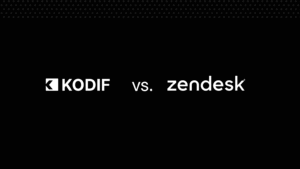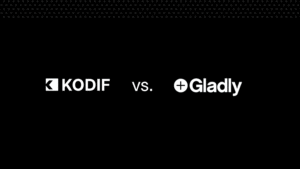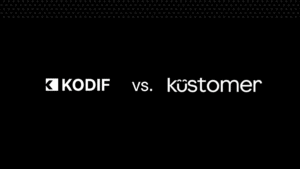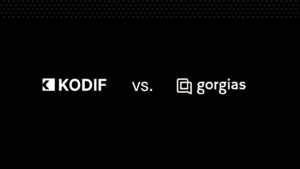Comprehensive data analysis revealing how AI-powered customer service transforms resolution rates, response times, and ROI for subscription brands and DTC companies
The economics of customer support have fundamentally shifted. While businesses traditionally viewed support as a cost center, AI-powered automation now delivers measurable revenue impact alongside dramatic cost reductions. According to KODIF platform data, ecommerce brands implementing autonomous AI agents achieve resolution rates between 76-92% depending on ticket type, with deployment timelines as short as 1.5 weeks.
Key Takeaways
- Market validation is substantial – The AI customer service market reaches $13.01 billion in 2024 and projects to $83.85B by 2033 at 23.2% CAGR
- Cost reduction is immediate – AI chatbot interactions cost $0.50 versus $6.00 for human interactions (12x difference)
- Resolution capabilities are proven – Case studies show routine inquiry automation rates reaching 80% with proper implementation
- Customer acceptance is high – 62% of customers prefer engaging with chatbots over waiting for human agents for simple tasks
Customer Support AI Adoption Statistics
1. AI customer service market valued at $13.01 billion in 2024
The AI customer service market demonstrates validated growth, reaching $13.01 billion in 2024 with projections to $83.85 billion by 2033 at 23.2% CAGR. This expansion reflects enterprise recognition that AI automation delivers measurable business outcomes. The market encompasses chatbots, AI-driven ticketing, sentiment analysis, and recommendation systems across cloud and on-premise deployments.
2. 85% of customer service leaders will explore conversational GenAI in 2025
Gartner research from December 2024 reveals 85% of CS leaders will actively explore or pilot customer-facing conversational GenAI in 2025, with 44% specifically exploring voicebots. This represents critical mass adoption where AI transitions from early adopter technology to competitive necessity.
3. 78% of organizations use AI in at least one business function
Enterprise AI adoption has reached mainstream status, with 78% of organizations deploying AI in at least one business function and 71% regularly using generative AI tools. Customer service ranks among the top functions for AI implementation due to clear ROI metrics and measurable performance improvements.
4. Ecommerce shows accelerated AI adoption
The retail and ecommerce segment is expected to grow at 26.0% CAGR, faster than the overall market average. This accelerated growth reflects ecommerce’s digital-first nature and subscription businesses’ particular need for scalable support automation.
According to a KODIF case study, Dollar Shave Club achieved 6x growth in containment and 3x increase in AI agent ticket coverage while targeting a 70% containment rate.
AI Resolution Rate Statistics
5. Technical support achieves 92% resolution rate
Based on KODIF platform data, advanced AI implementations demonstrate 92% resolution rates for technical support tickets, the highest performance across all ticket categories. This accuracy comes from AI’s ability to access technical documentation instantly, diagnose issues through structured troubleshooting, and execute solutions without escalation.
6. Order and shipping inquiries reach 88% AI resolution
Order and shipping management achieves 88% autonomous resolution through AI systems that integrate directly with order management and shipping platforms (KODIF platform data). These systems handle address changes, delivery date modifications, carrier updates, and tracking inquiries without human involvement.
7. Account management delivers 76% resolution rates
Account management tasks achieve 76% resolution rates through AI automation, handling email updates, password resets, subscription modifications, and profile changes (KODIF platform data). This category includes more complex identity verification and policy-based decisions.
8. Overall AI resolution rates average 84%
When aggregating performance across all ticket categories, AI systems deliver 84% average resolution rates according to KODIF platform data. Leading platforms achieve these rates through policy-driven automation that executes actions rather than just providing information.
Customer Satisfaction Impact
9. ReserveBar achieves 93% CSAT with AI
According to a KODIF case study, ReserveBar demonstrates exceptional outcomes, achieving 93% CSAT while saving 850 agent hours through AI implementation. This proves AI can maintain high satisfaction scores while delivering efficiency gains.
10. Trust Wallet achieves 2x CSAT increase in 1.5 weeks
A KODIF case study shows Trust Wallet achieved 2x CSAT increase within just 1.5 weeks of deployment while optimizing 90% of support tickets. This cryptocurrency platform handles complex security issues, transactions, NFTs, and token inquiries through AI automation.
11. 80% of customers report positive AI chatbot experiences
Customer perception data reveals 80% positive experience rates with AI chatbot interactions, dispelling concerns about customer resistance to automated support. This high satisfaction reflects improved AI capabilities including natural conversation, accurate responses, and seamless escalation when needed.
Response Time Improvements
12. Good Eggs achieves 40% reduction in Average Handle Time
A KODIF case study shows Good Eggs’ deployment of AI Copilot resulted in 40% AHT reduction by providing human agents with contextual information, AI-generated response drafts, and suggested actions.
ROI and Cost Savings
13. AI chatbot interactions cost $0.50 versus $6.00 for human interactions
Cost analysis reveals AI chatbot interactions cost approximately $0.50 compared to $6.00 for human-handled interactions, a 12x cost difference. This dramatic efficiency advantage makes AI economically compelling even when considering implementation and maintenance costs.
14. ReserveBar saves 850 agent hours through AI
According to a KODIF case study, ReserveBar saved 850 agent hours through AI automation while maintaining 93% CSAT. These saved hours can be redeployed to higher-value activities or eliminated to reduce costs.
15. Unity reduces ticket volumes by 8,000, saving $1.3 million
The gaming platform Unity achieved dramatic results by reducing ticket volumes by 8,000, generating $1.3 million in savings through AI agent deployment. This demonstrates AI’s effectiveness in high-volume technical support environments.
16. NIB Health Insurance saves $22 million
Financial services demonstrate exceptional ROI potential, as NIB Health Insurance saved $22 million through AI digital assistants while reducing customer service costs by 60% and phone calls by 15%.
Ticket Coverage and Containment
17. Dollar Shave Club achieves 6x growth in containment
According to a KODIF case study, Dollar Shave Club achieved 6x growth in containment rates alongside 3x increase in AI agent ticket coverage. The subscription brand now targets 70% containment rate, handling order management, account changes, and tier 2 tickets autonomously.
18. Trust Wallet optimizes 90% of tickets in 1.5 weeks
A KODIF case study shows Trust Wallet optimized 90% of support tickets within just 1.5 weeks, demonstrating fast time-to-value compared to traditional enterprise implementations requiring 6-9 months.
19. Mature AI adopters report 15% higher agent satisfaction
Organizations with mature AI implementations report 15% higher agent satisfaction compared to those without AI tools. This improvement comes from AI handling repetitive inquiries while enabling agents to focus on complex, meaningful customer interactions.
Implementation Speed
20. Trust Wallet deploys in 1.5 weeks versus 6-9 month enterprise timelines
According to a KODIF case study, Trust Wallet achieved full deployment in 1.5 weeks compared to 6-9 month timelines typical of enterprise AI solutions. This dramatic difference in time-to-value enables faster ROI realization and reduced implementation risk.
21. Only 25% of call centers have successfully integrated AI
Despite overwhelming interest, research shows only 25% of call centers have successfully integrated AI automation, revealing a significant implementation gap. This challenge creates opportunities for platforms offering faster, simpler deployment processes.
22. 61% report data assets aren’t ready for AI
A major implementation barrier emerges as 61% of companies report their data assets aren’t prepared for AI deployment (Gartner, December 2024). This includes issues with data cleanliness, accessibility, and integration across systems.
Implementation Best Practices
The path to successful AI customer service implementation starts with clear objectives and realistic timelines. Leading ecommerce brands prioritize these critical elements:
Pre-Implementation Assessment:
- Analyze current ticket volume and categorization to identify high-value automation opportunities
- Evaluate existing technology stack for integration compatibility
- Establish baseline metrics including resolution time, CSAT, and cost per ticket
- Define success criteria aligned with business objectives
Platform Selection Criteria:
- Ecommerce-native capabilities – Pre-built integrations with Shopify, subscription platforms, returns management systems
- Resolution over deflection – Systems that execute actions (refunds, exchanges, subscription changes) rather than just providing information
- Implementation speed – Weeks rather than months deployment timelines with no-code policy creation
- Compliance and security – SOC 2 Type 2, GDPR, and CCPA compliance for enterprise requirements
Success Measurement:
- Track resolution rates by ticket type to identify improvement opportunities
- Monitor customer satisfaction scores to ensure quality maintenance
- Calculate ROI including labor savings, efficiency gains, and revenue impact
- Measure ticket volume trends to validate containment improvements
Frequently Asked Questions
What is the average resolution rate for customer support AI in ecommerce?
Customer support AI achieves 80% resolution rates for routine inquiries on average with proper implementation. According to KODIF platform data, best-in-class implementations reach 76-92% depending on ticket type. Technical support demonstrates the highest performance at 92%, while order and shipping inquiries achieve 88%. These rates apply to ecommerce and subscription businesses using platforms with deep system integrations that enable action execution beyond information provision.
How much can AI reduce customer support costs?
Mid-market ecommerce brands implementing AI customer service typically achieve significant cost reductions through decreased labor requirements and improved efficiency. The cost difference between AI interactions at approximately $0.50 versus human interactions at $6.00 creates substantial savings at scale. Additional value comes from revenue protection through faster response times and improved satisfaction scores.
What CSAT scores do AI chatbots achieve?
Leading AI implementations maintain or exceed human-level satisfaction scores. According to KODIF case studies, top performers like ReserveBar achieve 93% CSAT. Research shows 80% of customers report positive experiences with AI chatbot interactions. The key differentiator is AI’s ability to provide instant responses with complete customer context rather than making customers wait or repeat information.
How long does it take to implement customer support AI?
Implementation timelines vary dramatically by platform. According to KODIF case studies, Trust Wallet achieved 90% optimization in 1.5 weeks, demonstrating rapid deployment. Standard implementations for ecommerce and subscription businesses typically complete in 2-4 weeks including AI training on company-specific policies, integration with existing helpdesk and ecommerce platforms, and onboarding. The main variable is data quality—organizations with clean historical ticket data and well-documented policies deploy faster.
What’s the difference between free AI chatbots and enterprise platforms?
Free AI chatbots typically provide information retrieval and basic FAQ responses but cannot execute actions like processing refunds, modifying subscriptions, or generating return labels. Enterprise platforms integrate deeply with ecommerce systems, subscription management, and order platforms to perform actions autonomously. Free tools often lack security compliance (SOC 2, GDPR, HIPAA), omnichannel support, and policy-based automation required for ecommerce businesses. Organizations serious about measurable business outcomes require purpose-built ecommerce platforms.









